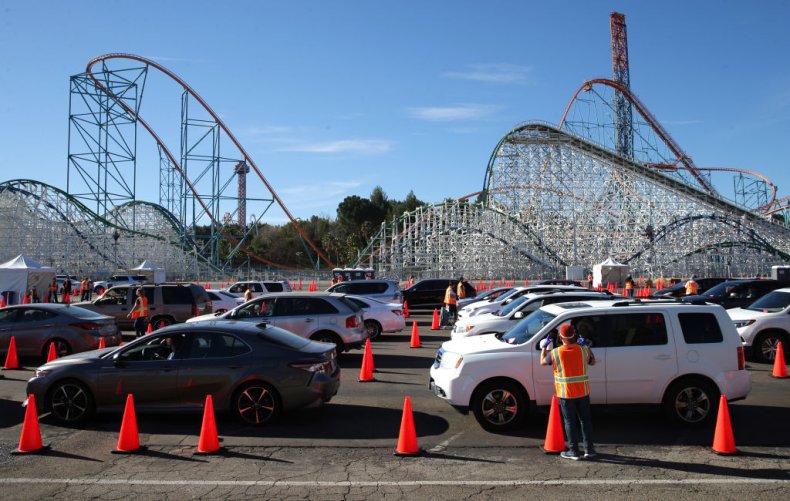[ad_1]
A blueprint for how theme parks in California could reopen safely amid the COVID-19 pandemic led to reports that a screaming ban on rides was being considered.
Attractions in parts of the state, including Los Angeles county, are able to begin reopening from April 1 after more than a year of being closed.
But they will still face restrictions, including a ban on indoor dining and capacity limits.
The Claim
Several news outlets reported that a ban on yelling and shouting would be imposed on visitors to theme parks in California.
It followed California Attractions and Parks Association (CAPA), a statewide group representing permanent amusement parks, publishing its plan for reopening safely.
San Jose-based newspaper The Mercury News reported: “Six Flags Magic Mountain, Knott’s Berry Farm and Disneyland may need to add new warning signs at the entrances to their roller coasters and thrill rides when the California theme parks finally reopen: No screaming.
“You read that right. A roller coaster tradition as old as thrill rides themselves could go silent in California with the introduction of proposed statewide COVID-19 theme park guidelines that would bring an end to one of the most iconic midway sounds: Screaming.”
CBS LA, USA Today and other publications worldwide reported the story in a similar way, suggesting that shouting and screaming would be prohibited to reduce the risk of airborne particles infecting other customers.
The Facts
CAPA, whose members include some of the largest theme parks in the state, published its “Responsible Reopening Plan” as part of preparations for reopening venues while minimising the risk of COVID-19 spreading.
The document listed one of the criteria as the “ability to limit activities that are known to cause increased spread (e.g.: singing, shouting, heavy breathing; loud environments will cause people to raise voice).”
The plan stated that to counter this: “Face covering usage and/or modifications to seat loading patterns will be required on amusement park rides to mitigate the effects of shouting. Additionally, on rides, guests generally face in one direction.”

Mario Tama/Getty Images
But the CAPA plan did not suggest shouting would be banned, and following media reports of such a ban, the trade association issued a clarification.
In a statement, the group said “at no point” had it recommended limiting yelling or screaming on amusement park rides to reduce COVID transmission.
“When the state’s Blueprint for a Safer Economy was released in August, it identified a range of risk criteria for all industries to address, including: Ability to limit activities that are known to cause increased spread (e.g. singing, shouting, heavy breathing; loud environs will cause people to raise voice).’
“The responsible reopening plan that CAPA released in September addressed that risk criteria as follows: Face covering usage and/or modifications to seat loading patterns will be required on amusement park rides to mitigate the effects of shouting. Additionally, on rides, guests generally face in one direction.”
This prompted a series of corrections, including this from CBSLA: “A previous version of this story indicated that theme parks may be required to ask visitors not to scream on rides. The state of California has not released any such protocols.”
USA Today wrote: “An earlier version of this story mischaracterized California Attractions and Parks Association’s recommendations to mitigate the effects of shouting on theme park rides.”
The Ruling
False.
CAPA set the record straight in its statement, and news organizations that had reported a ban was imminent later retracted those claims.
But the idea of a ban on shouting wasn’t so far-fetched.
In Japan, visitors to the Fuji-Q Highland near Tokyo were urged to “scream inside your heart” while also wearing masks.
Newsweek contacted CAPA for further comment.
[ad_2]
Source link